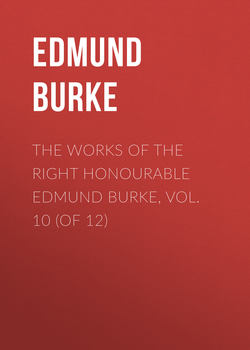The Works of the Right Honourable Edmund Burke, Vol. 10 (of 12)

Реклама. ООО «ЛитРес», ИНН: 7719571260.
Оглавление
Edmund Burke. The Works of the Right Honourable Edmund Burke, Vol. 10 (of 12)
SPEECHES IN THE IMPEACHMENT OF WARREN HASTINGS, ESQUIRE LATE GOVERNOR-GENERAL OF BENGAL
SPEECH IN OPENING (CONTINUED.) FEBRUARY, 1788
THIRD DAY: MONDAY, FEBRUARY 18, 1788
FOURTH DAY: TUESDAY, FEBRUARY 19, 1788
SPEECH ON THE SIXTH ARTICLE OF CHARGE. April and May, 1789
FIRST DAY: TUESDAY, APRIL 21, 1789
SECOND DAY: SATURDAY, APRIL 25, 1789
THIRD DAY: TUESDAY, MAY 5, 1789
Extract of a Letter from Mr. Hastings to Colonel Champion, 31 August, 1774
FOURTH DAY: THURSDAY, MAY 7, 1789
Extract of a Letter from William Larkins, Accountant-General of Bengal, to the Chairman of the East India Company, dated 5th August, 1786
Отрывок из книги
My Lords,—The gentlemen who are appointed by the Commons to manage this prosecution, have directed me to inform your Lordships, that they have very carefully and attentively weighed the magnitude of the subject which they bring before you with the time which the nature and circumstances of affairs allow for their conducting it.
My Lords, on that comparison, they are very apprehensive, that, if I should go very largely into a preliminary explanation of the several matters in charge, it might be to the prejudice of an early trial of the substantial merits of each article. We have weighed and considered this maturely. We have compared exactly the time with the matter, and we have found that we are obliged to do as all men must do who would manage their affairs practicably, to make our opinion of what might be most advantageous to the business conform to the time that is left to perform it in. We must, as all men must, submit affairs to time, and not think of making time conform to our wishes; and therefore, my Lords, I very willingly fall in with the inclinations of the gentlemen with whom I have the honor to act, to come as soon as possible to close fighting, and to grapple immediately and directly with the corruptions of India,—to bring before your Lordships the direct articles, to apply the evidence to the articles, and to bring the matter forward for your Lordships' decision in that manner which the confidence we have in the justice of our cause demands from the Commons of Great Britain.
.....
I find, that, about the month of July, 1780, the Rajah of Dinagepore, after a long and lingering illness, died, leaving an half-brother and an adopted son. A litigation respecting the succession instantly arose in the family; and this litigation was of course referred to, and was finally to be decided by, the Governor-General in Council,—being the ultimate authority to which the decision of all these questions was to be referred. This cause came before Mr. Hastings, and I find that he decided the question in favor of the adopted son of the Rajah against his half-brother. I find that upon that decision a rent was settled, and a peshcush, or fine, paid. So that all that is in this transaction is fair and above-board: there is a dispute settled; there is a fine paid; there is a rent reserved to the Company; and the whole is a fair settlement. But I find along with it very extraordinary acts; for I find Mr. Hastings taking part in favor of the minor, agreeably to the principles of others, and contrary to his own. I find that he gave the guardianship of this adopted son to the brother of the Ranny, as she is called, or the widow of the deceased Rajah; and though the hearing and settling of this business was actually a part of the duty of his office, yet I find, that, when the steward of the province of Dinagepore was coming down to represent this case to Mr. Hastings, Mr. Hastings, on pretence that it would only tend to increase the family dissensions, so far from hearing fully all the parties in this business, not only sent him back, but ordered him to be actually turned out of his office. If, then, the 40,000l. be the same with the money taken from the Rajah in 1780, to which account it seems to refer, (for it was taken in regular payments, beginning July, 1780, and ending at the same period in 1781,) it was a sum of money corruptly taken by him as a judge in a litigation of inheritance between two great parties. So that he received the sum of 40,000l. for a judgment; which, whether that judgment was right or wrong, true or false, he corruptly received.
This sum was received, as your Lordships will observe, through Gunga Govind Sing. He was the broker of the agreement: he was the person who was to receive it by monthly instalments, and he was to pay it to Mr. Hastings. His son was in the office of Register-General of the whole country, who had in his custody all the papers, documents, and everything which could tend to settle a litigation among the parties. If Mr. Hastings took this bribe from the Rajah of Dinagepore, he took a bribe from an infant of five years old through the hands of the Register. That is, the judge receives a bribe through the hands of the keeper of the genealogies of the family, the records and other documents, which must have had the principal share in settling the question.
.....